It's Great Being A Priest '07
Father Ted is one of those very few television programs whose high quality is agreed upon by all of us here at Noise to Signal. This is especially an achievement when you take into consideration just how little we hesitate to make it known when we find fault with something.
With a new box set of the three series of Father Ted released today, we all pitched in to contribute a write-up of one particular episode that appeals to us - not necessarily a favourite, but just something that we felt represented some aspect of the show as a whole. Some reason Ted stands so agreeably high above most other sitcoms. Some reason that, yes, it's great being a priest.
The Passion of Saint Tibulus - Rachel George
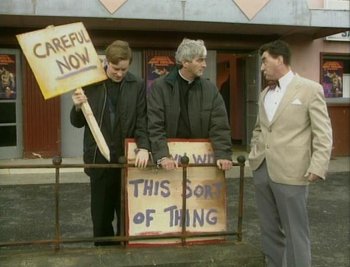 This episode of Ted is my personal favourite, due to three attributes: the horror film aesthetic, Father Jack showing off his cunning, and, best of all, the Catholic church being lampooned perhaps more strongly and more bitterly than in any other episode. And if there's one thing I hate more than David Cameron, it's Christianity.
This episode of Ted is my personal favourite, due to three attributes: the horror film aesthetic, Father Jack showing off his cunning, and, best of all, the Catholic church being lampooned perhaps more strongly and more bitterly than in any other episode. And if there's one thing I hate more than David Cameron, it's Christianity.
The horror film feel is first introduced in the opening scene through some judicious use of thunder storm sound effects, Ted's ability with Iberian languages, Jack's hideous (yet thrifty) ear candles ('we've almost enough for a Papal funeral') and a seemingly never ending game of Cluedo. Oh, and the fact that Father Hernandez (a Cuban priest staying at the Parochial House, ably translated by a voice over by the dude/rodent from Tales of the Riverbank, but that is another story) is Gomez Addams with a crucifix, a video recorder and a mantelpiece ornament with a massive knob.
Anyway, this slasher flick aspect lends the proceedings a darkness and a medieval feel, suitable to the religious censorship at the episode's centre, and it also germinates many of the jokes, rooted as they are in the sexuality/madness of Craggy Island's population. The O'Leary's angry exchange and Mrs O'Leary's threatening knife, backed up by the chirpy filth of the natives ('no! Billy's is rounder at the top') mixes effortlessly with Ted and Dougal's ineffective (even handcuffed – as obvious a metaphor if ever there was one) authority, the continually overcast/raining/stormy background and Bishop Brennan's swirling cloak and prominent teeth. On a casual watch this is perhaps missed, which is, I think, intentional – the unease one feels over the pervasive hypocrisy is almost subconsciously aided by the aesthetic, reinforcing the ludicrous, old fashioned ideals of the Church in its own time-honoured habit of indoctrination. It is a masterstroke.
The artificiality of the Church's morality is the meat of the episode, however, and despite the potentially tired (or just continually used) subject matter it is delivered with ingenuity, in a system of layered exchanges, thick with jokes and with the morality swinging back and forth like a pendulum. The scene in the cinema is perhaps the height of this, as Ted and Dougal's supposedly outraged booing is halted on the grounds that it's disturbing the very people it's supposed to disturb. Ted then negotiates himself and Dougal the usual half price on account of their dog collars and also a fake 'throwing out' at the end of the film to make a fuss. They then stand outside with the best protest placards ever made in recorded human history, and single-handedly make the film the most popular ever to be shown on Craggy Island.
This strata of gags is perfect, delicious and outrageous, but in yet more layering, Linehan and Mathews keep back their most biting criticism for a more thorny issue; the difficult celibacy imposed on Catholic ministers. Father Hernandez's ruminations on the problems of sexless life foreshadow Bishop Brennan's own indiscretions, which (although utterly understandable given he's… well… mostly human) probably (at least in Catholic logic) far outweigh anything Ted, Dougal or Jack did to deserve Craggy Island. The scenes in the video exposing him are cutesy, but are also natural and sweet; Linehan and Mathews hardly need point out the twisted fact that this normal relationship will be his undoing (or the saviour of Ted, Dougal and Jack).
Indeed, the final, perfecting aspect of this episode is how it uses this video and the priests' failings with the film as a device to flesh out Ted, Dougal and Jack's backgrounds and characters. The most important part of this is Jack's conniving mind – so far he's just been a filthy drunk with the best simple jokes ('would you like a glass of brandy Father Jack?') but here he shows he's much more than that, when he saves them all from places with arrow requirements/no sewerage. In summary: give us a P please Bob. Perfect.
Grant unto Him Eternal Rest - Austin Ross
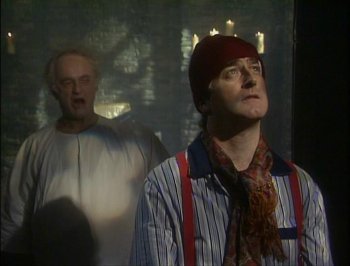 "Falling Obliquely Against the Lamplight"
"Falling Obliquely Against the Lamplight"
Father Ted is great. On that we can agree. (And if we can't, then I'm going to have to ask you to please leave as quietly as possible. We don't want to disturb the other patrons, now, do we?)
So. Why is Father Ted so great? There really is a vast multitude of reasons. One could create a veritable laundry list of great scenes, moments and lines. However, I won't make such a list here. Instead, there is one moment on which I will focus. This moment demonstrates some of the attributes that make this show such a success.
Grant Unto Him Eternal Rest is a very early episode in Father Ted. It was the pilot episode – though it ended up becoming the final episode of the first six-episode series. Father Jack dies after drinking floor polish. Ted and Dougal end up spending the night in the chapel with Father Jack's coffin, in accordance with Jack's final wishes.
And there is one moment that has stuck with me since first seeing the episode. While Dougal sleeps, Father Ted gets up and watches the falling snow. He says, "It's beginning to snow again. The flakes, silver and dark, are falling obliquely against the lamplight. It's probably snowing all over the island. On the central plain, on the treeless hills...falling softly upon the graveyards...upon the crosses and the headstones. Upon all the living, and the dead." The images accompanying this speech are magnificent...and it brings a sense of mortality and realism to this episode. It is a touching and affecting moment. It displays a side of Father Ted's personality that we were not able to see while Father Jack was alive.
Of course, this moment is undercut when Father Jack miraculously arises from the dead and tells Father Ted to "Feck off!"
And that's the beauty of the moment. There is an inherent sadness in the fact that these three priests are trapped on Craggy Island. It's a sadness that is rarely fully touched upon in the series, but is always present. It gives the stories a sense of tragedy, which only serves to heighten the comedy. Any good writer will tell you that comedy and tragedy are so closely linked that the lines between the two begin to blur. How one defines comedy and tragedy is based almost solely upon how the material is handled. In the case of Father Ted, their characters and the situations they are placed in reveal the inherent humor in their predicament. Linehan and Mathews dance around this sense of isolation and loss in many episodes, never fully exploring it; instead, they give their audience a taste of sadness and then use that moment to intensify the humor. Linehan and Mathews know their craft, and they display their proficiency in this scene.
"Yes, the newspapers were right: snow was general all over Ireland. It was falling on every part of the dark central plain, on the treeless hills, falling softly upon the Bog of Allen and, farther westward, softly falling into the dark mutinous Shannon waves. It was falling, too, upon every part of the lonely churchyard on the hill where Michael Furey lay buried. It lay thickly drifted on the crooked crosses and headstones, on the spears of the little gate, on the barren thorns. His soul swooned slowly as he heard the snow falling faintly through the universe and faintly falling, like the descent of their last end, upon all the living and the dead." - (James Joyce, The Dead)
The Old Grey Whistle Theft - Michael Lacey
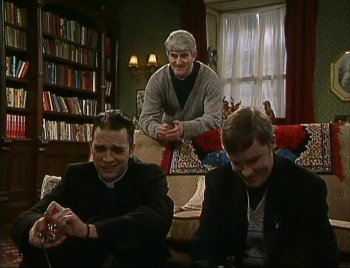 I'm a little bit intimidated by the in-depth knowledge of Ted already on display in this article. When I like a sitcom as much as I like Ted, my critical brain curls up into a ball, unwilling to really examine the show unless I somehow unravel its quality in my mind. Nonetheless, I thought I would try and write a word or two about The Old Grey Whistle Theft, as it's a good episode to illustrate how Linehan and Mathews at the height of their powers could take a fairly half-baked plot and turn it into an episode funnier than most sitcoms even aspire to be.
I'm a little bit intimidated by the in-depth knowledge of Ted already on display in this article. When I like a sitcom as much as I like Ted, my critical brain curls up into a ball, unwilling to really examine the show unless I somehow unravel its quality in my mind. Nonetheless, I thought I would try and write a word or two about The Old Grey Whistle Theft, as it's a good episode to illustrate how Linehan and Mathews at the height of their powers could take a fairly half-baked plot and turn it into an episode funnier than most sitcoms even aspire to be.
As a child visiting family in Ireland, I was always amused (and I'll have to be careful not to offend that side of the family here) by the total weirdness of "popular culture" in small towns. Coming from a city, where youths operate in clearly defined rival factions of goths and "chavs" and all sorts of other cults, it's weird to go somewhere where there wouldn't be enough kids for a rival gang system, so they all live in harmony together, sharing their new musical discoveries with their Grandparents and dressing in weird grunge-hip-hop-chav hybrid outfits. The character of Father Damo Lennon, whose malign influence Dougal falls over in this episode, reminded me of this funny culture. He has an earring, hair like Stewart Lee, smokes with the self-regard of a 14 year old, and prefers Oasis to Blur. He's clearly every bit the clueless idiot Dougal is, but with all the charm replaced by bravado. Which makes the spectacle of Dougal falling under his spell all the more amusing, and Ardal does some great stuff here, especially the first scene with his earring, and a terrific joke about crack cocaine. The crack joke sort of tampers with the episode's internal logic (if Damo really is a crackhead, and giving Dougal crack, he's not so much of a smalltime rebel as an actual nasty crackhead, which isn't as funny), but it doesn't really register because the episode has quite a loose feel and takes lurches for the surreal at several turns.
It's almost like that episode of I'm Alan Partridge where he's walking up the hard shoulder with a can of Castrol GTX singing Goldfinger - it's as if Alan is speaking for the writers, saying he's not quite sure what to do this episode, but funny enough to distract you from that point. Similarly, this episode Ted goes for a picnic, which serves a minor purpose in the plot (the introduction of the man in charge of the campsite, and the titular whistle) but is really just an excuse for a few great sight gags and Arthur Mathews' turn as the angry picnicker who abides creatively to the no-swearing rule.
It's obviously not one of the very best episodes of Ted (for me, that's probably the sheep one) but it's remarkable on rewatching the episode how much mileage they get out of the idea and how many great big laughs there are. The guy losing the use of his legs, Ted's ridiculous explanation for the whistle being in his pocket, Mrs. Doyle standing in the dark, Dougal bursting out of the front door with the football... it's like one of those Beatles B-sides that you download one day which turns into your favourite Beatles song, or something, because there's loads of brilliant jokes about priests in it.
A Song for Europe - Ian Symes
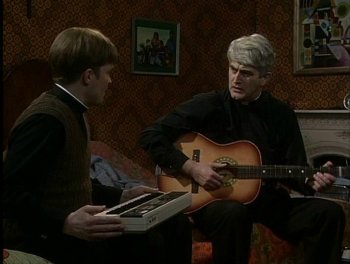 So, let's get it out of the way: My Lovely Horse is brilliant. From the writing process ("take this lump of sugar, baby, you know you want to") onwards, everything about it is spot-on. The first performance gives you a chance to soak up the excellent lyrics, before the full Norwegian-plagiarising, Neil Hannon version completely blows you away with its awesomeness. And of course, the obligatory video. I must have seen it hundreds of times, but that little shot of Dougal waving to someone off-camera makes me crack up every single time. As does his face during the ping pong game. So much attention to detail - sheer perfection.
So, let's get it out of the way: My Lovely Horse is brilliant. From the writing process ("take this lump of sugar, baby, you know you want to") onwards, everything about it is spot-on. The first performance gives you a chance to soak up the excellent lyrics, before the full Norwegian-plagiarising, Neil Hannon version completely blows you away with its awesomeness. And of course, the obligatory video. I must have seen it hundreds of times, but that little shot of Dougal waving to someone off-camera makes me crack up every single time. As does his face during the ping pong game. So much attention to detail - sheer perfection.
But there's so much more to the episode, and it features myriad examples of the basic tenets of Ted in action. There's the rivalry with Father Dick Byrne, and although the banter isn't quite as funny as it is in other episodes, as a plot device it's superb. There's also Ted's discomfort when dealing with religious issues; his awkwardness when Charles mentions his relationship with Fred, his fence-sitting when challenged on the Catholic stance on homosexuality, and his eagerness to confirm his own heterosexuality when he introduces Dougal as his 'partner'.
And of course, there's great examples of classic Ted joke formulae. There's the cut-to joke, where Ted assures Dougal that the song-writing is just a bit of fun, before time passes to show him indulging in an excellent sweary rant. There's two great pull-back-and-reveal jokes in the scene where the duo decide to steal the tune: Dougal adds layer after layer of detail when discussing the obscurity of the track ("oh wait, that's the B-side") and the fate of those involved ("...including everyone who was involved in the song..."). Then there's the background jokes that you only notice on second viewing, my particular favourite being one of the other Song For Ireland entrants being called "You Dirty English Bastards". As the credits roll over the main characters reacting (another classic Ted joke) to the perpetual "nil points" announcements, you finish one of Ted's most hilarity-inducing, repeatable and iconic episodes still laughing.
New Jack City - Tanya Jones
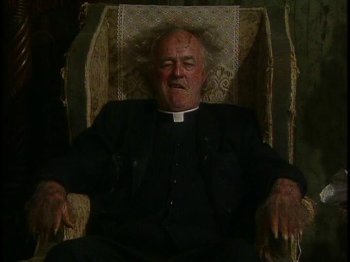 Jack City isn't a favourite amongst fans as far as I'm aware, but I'm extremely fond of it, not least because of the magnificently malevolent performance of Brendan Grace as Father Fintan Stack. After Father Jack gets yet another attack of Hairy Hand Syndrome and is packed off to St. Clabberts' Old Folks Home, Bishop Brennan gets another chance to show his contempt for Ted and Dougal by sending them Father Stack, from his seemingly unending supply of wayward clergy.
Jack City isn't a favourite amongst fans as far as I'm aware, but I'm extremely fond of it, not least because of the magnificently malevolent performance of Brendan Grace as Father Fintan Stack. After Father Jack gets yet another attack of Hairy Hand Syndrome and is packed off to St. Clabberts' Old Folks Home, Bishop Brennan gets another chance to show his contempt for Ted and Dougal by sending them Father Stack, from his seemingly unending supply of wayward clergy.
It would be tempting for Brendan Grace to play Father Stack as a sulky teenager, given his lack of respect for the church: "Ya dorty fecker" and liking for playing jungle music loudly at 3am in the morning, but he brings far more to the role. Whilst teenage sulking is mostly harmless, Father Stack genuinely doesn't care about anyone else, breaking the news that he smashed up Ted's car by stating: "I had my fun, and that's all that matters", and displays a truly shocking lack of respect for his surroundings by drilling huge holes in the wall. His general air of evil is enhanced by him cackling insanely through the night, and by him getting Dougal pissed. The scamp. Even Mrs Doyle can't get him to agree to a cup of tea.
Naturally, Ted loathes Father Stack: "Oh, worse than Hitler. You wouldn't find Hitler playing jungle music at 3 o'clock in the morning", but part of this dislike surely stems from the fact that Ted is actually just as selfish as Stack, but is prevented from doing exactly what he wants for fear of his social standing becoming even more damaged. Stack has no such inhibitions, and the only time he shows anything approaching fear in New Jack City is when he falls victim to Hairy Hands Syndrome himself. Stack is the only person which makes Ted and Dougal miss Father Jack, providing a good excuse for a montage of Jack injuring Ted in several inventive ways.
Obviously, Stack gets his comeuppance by being sent to St. Clabberts and being surrounded by numerous Father Jack clones, although one gets the impression that it's one of the few places in which he might actually thrive. It always amuses me to think of Father Stack defying the nuns by playing jungle music as loud as possible after lights out, and it's satisfying to think that Stack is probably a composite of all the irritating neighbours that Graham Linehan ever had. It's a sweeter form of revenge than complaining to the council.
Are You Right There, Father Ted? - Jonathan Capps
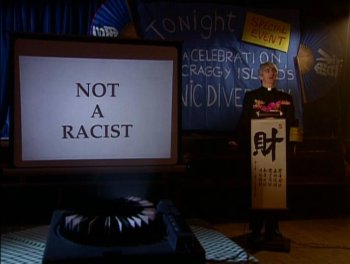 There's something really off about series three of Father Ted. It's not bad - in fact it's brilliant - it just feels really different to the seventeen episodes that precede it. It was difficult for me to put my finger on at first, but when you watch Are You Right There Father Ted it starts to become clear, as this episode more than any sums up what is different about series three.
There's something really off about series three of Father Ted. It's not bad - in fact it's brilliant - it just feels really different to the seventeen episodes that precede it. It was difficult for me to put my finger on at first, but when you watch Are You Right There Father Ted it starts to become clear, as this episode more than any sums up what is different about series three.
It's fair to say that after two series ideas that fit within the internal consistency of the Ted universe start to run thin and a new mine of ideas needs to be worked on - so series three ended up with less episodes about the vaguely believable day to day events of a remote parish (all be it with a hefty dose of complete madness thrown in on top) but with the more fanciful ideas actually forming the back-bone of the episodes, giving it all a much lighter, manic and surreal feel. I think that's what sets this series apart from the rest. I'm still buggered if I can choose which is best, mind.
In the first five to ten minutes of Are You Right There Father Ted we get Ted living in an idyllic new Parish, only to be cruelly and swiftly taken away (all for the sake of one cutaway gag), Father Jack living in a box gor no real reason, Mrs. Doyle falling off the roof, the hint that Dougal's hamster could ride a tiny bicycle, a perfectly square piece of dirt and Jack living in the grandfather clock. It all seems like normal Ted style jokes and situations, but they're all crammed i so densely, with the audience *really* going for everything that's thrown at them. It's so manic, like everything that's ever been funny about Ted but distilled into an incredibly dense piece of comedy. All the stuff with the Nazi priest seems more traditional (except for perhaps the old Nazi soldier living in his store room) but the fact that Linehan and Mathews decided to invent a whole new Chinese community for Craggy Island simply for a few 'Ted is a racist' gags and some great cutaways shows again the heightened sense of surreality in the show.
Of course, the end ties everything together perfectly, with the reveal of Nazi memorabilia in Ted's house, the hamster taking a ride on his bicycle (probably the most obvious example of how much the show had changed in tone) and finally Jack emerging from a box of whiskey bottles in an SS uniform. It's certainly close to a perfect episode of comedy, but is it Father Ted as we previously knew it? Not quite.
The Mainland - Seb Patrick
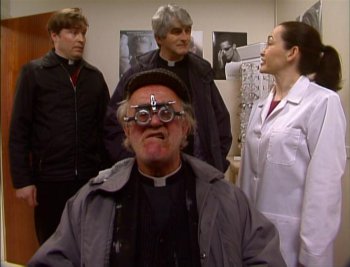 Here's an episode that just shouldn't work. It takes almost every established trope of a successful sitcom doing a "blockbuster" episode in its later years, and yet somehow makes all of them work. It takes the characters out of their usual setting (placing them on the mysterious "mainland" for the first time), it features the return of an extremely popular one-off character (Father Noel Furlong, from the days Graham Norton was actually funny), and has a "celebrity guest star" (Richard Wilson) playing himself. In most other sitcoms, this would be an unmitigated, self-indulgent disaster.
Here's an episode that just shouldn't work. It takes almost every established trope of a successful sitcom doing a "blockbuster" episode in its later years, and yet somehow makes all of them work. It takes the characters out of their usual setting (placing them on the mysterious "mainland" for the first time), it features the return of an extremely popular one-off character (Father Noel Furlong, from the days Graham Norton was actually funny), and has a "celebrity guest star" (Richard Wilson) playing himself. In most other sitcoms, this would be an unmitigated, self-indulgent disaster.
Thankfully, Ted isn't most other sitcoms. And so The Mainland is an utter joy from start to finish. Removing the quartet from Craggy Island, rather than being a gimmick, opens up a wealth of gag opportunities, and the plot is properly constructed around it, as well as finally giving Mrs Doyle a chance to interact with a character that doesn't wear a dog collar. Norton is perhaps even funnier than in his debut appearance in "Hell" - the "list of enemies" moment something of a highlight - and the Richard Wilson plot is absolutely inspired, from the first time we see Dougal watching One Foot In The Grave, to his actual appearance, in which his beating up Ted (twice!) is one of the finest moments in the history of the series.
Gimmicks aside, The Mainland is filled with so many classic moments and lines that to even try and list them all would simply be tiresome. It's worth highlighting, though, perhaps the two best examples the series has to offer of making the viewer laugh at something they don't actually get to see. First of all, during the scene with Jack in the opticians, it's notable that the word "drink" isn't actually said once - and likewise, we cut away before he can get the chance to react to "Feckarse Industries". This means the joke isn't overcooked, and is therefore exponentially funnier because we get to imagine it rather than having it thrust in our faces. Similarly, late in the episode, Jack's encounter with a well-meaning AA member in the pub is an absolute masterpiece of comic timing and editing - in a tactic shamelessly nicked from The Simpsons, we cut mid-line from "Believe me, you'll thank me for..." to a shot of an ambulance. Utterly perfect implied humour, and Ted at its absolute best.
Kicking Bishop Brennan up the Arse - Phil Reed
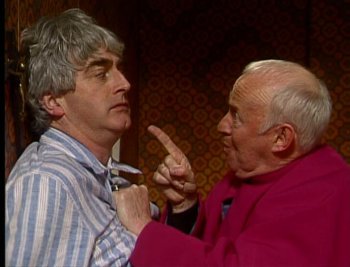 Kicking Bishop Brennan Up the Arse is a perfect example of a ridiculous plot being used to great effect in enhancing (rather than manipulating) the comedy. It follows from the (significantly weaker) Escape From Victory episode, but stands completely on its own, and feels more like a complete story than it does any kind of natural conclusion. Even the "recap" (with decidedly different camera angles/performances/score) seems to suggest that this episode, while indeed following up the promise issued at the end of the previous one, considers itself a separate piece altogether.
Kicking Bishop Brennan Up the Arse is a perfect example of a ridiculous plot being used to great effect in enhancing (rather than manipulating) the comedy. It follows from the (significantly weaker) Escape From Victory episode, but stands completely on its own, and feels more like a complete story than it does any kind of natural conclusion. Even the "recap" (with decidedly different camera angles/performances/score) seems to suggest that this episode, while indeed following up the promise issued at the end of the previous one, considers itself a separate piece altogether.
And what a piece it is. Kicking Bishop Brennan Up the Arse is a masterpiece of comic writing, and also a brilliant experiment in audience psychology as it manages to build its tension continuously, throughout the entire episode. Its entire plot may be given away in the title, but it builds and builds, winds itself more tightly with every scene, and constantly ups the anticipation for the climactic kick up the arse. And what's really brilliant about this, from a writing standpoint, is that the titular K.U.t.A. comes about halfway through the episode, without actually diffusing the tension. The tension is instead deferred to a second expectation; no longer anticipating the kick, the audience is anticipating Bishop Brennan's realization of, and retaliation for, what has happened.
It's a brilliant, absolutely perfect structural move, and it allows the episode to shed its own gimmick midway through the story without sacrificing anything it's been building toward. The tension never lets up until the final seconds, during which Ted is booted across the parochial house lawn; a moment which gets a huge laugh and a round of applause not only because of its own visually-comic value, but because the writers have, psychologically, brought their audience along to one precise point of release.
It's also an interesting episode in terms of the show's own greater formula. Each series has a Bishop Brennan episode, but during his previous two visits, the Craggy Island priests were at his mercy. This time - though he doesn't realize it - he is at their mercy. It's an interesting reversal of series two's The Plague; rather than trying to keep Bishop Brennan away from a certain set of circumstances, they are trying to manipulate him into a particular situation.
And as if spot-on storytelling weren't enough, the comedy is as sharp and perfect as ever, featuring at least two of the best Dougal moments in the entire run of the show ("Oh, wait, it's a film," and "Do you mind if Father Maguire takes a few photographs?"). Jim Norton delivers, as ever, an agonizingly perfect read of every line (nobody else could have made "Crilly, it's just an indistinct squiggle" sound so flatly forceful). And Ian Fitzgibbon, as Father Jessup, has certainly earned his place in the Comedy Priest Hall of Fame, if only because he facilitates a definite, unforgettable highlight of the episode: Mrs. Doyle learning about sarcasm.
About this entry
- By Team NTS
- Posted on Tuesday, October 30 2007 @ 12:00 am
- Categorised in TV, Review
- Tagged with father ted
- 11 comments

The three best episodes of series 3 are featured here. Speed 3 is also good I suppose but the others aren't up to Ted standards. The last episode always does my head in so much. The suicidal priest (played by Tommy Tiernan) story is pretty crap (just what the heck were they thinking with the 'Shaft' part?) and it only seems to exist for the Radiohead gag at the end, which is funny but fucks me off for some reason. Maybe because I'm a big Radiohead fan, or the fact that they just shouldn't be mentioned in this world, stuff like this and the Richard Wilson appearance are too jarringly real.
By performingmonkey
October 30, 2007 @ 3:38 am
reply / #
>(just what the heck were they thinking with the 'Shaft' part?)
You've got to be kidding me...that scene (and the Radiohead bit on the bus) is brilliant. One of my favorite musical moments in all of sitcomdom.
By Miguel Sanchez
October 30, 2007 @ 11:55 am
reply / #
Ah, that's all MY favourite episodes covered! Excellent read...
Although I think Graham Norton's presentation of Bohemian Rhapsody would have deserved being mentioned :)
By Marleen
October 30, 2007 @ 1:36 pm
reply / #
>Jim Norton delivers, as ever, an agonizingly perfect read of every line (nobody else could have made "Crilly, it's just an indistinct squiggle" sound so flatly forceful).
Even when we were admiring the gobsmacking amazingness of Pompeii, John and I still couldn't resist laughing about the silly things Linehan and Matthews got this distinguished actor to do. And do so well.
By Tanya Jones
October 30, 2007 @ 1:52 pm
reply / #
>Although I think Graham Norton's presentation of Bohemian Rhapsody would have deserved being mentioned :)
Good point. "Will y'DO the fandango?" gets me every time.
By Tanya Jones
October 30, 2007 @ 1:57 pm
reply / #
So, can we comment on Linehan's blog with a link then? Or is that just rude? ;)
By Rach
October 30, 2007 @ 4:47 pm
reply / #
Going on recent form he'll probably call us all sad nerds at even the slightest hint of less than glowing comments. Although there aren't many of those in the article.
By Jonathan Capps
October 30, 2007 @ 9:49 pm
reply / #
> Although there aren't many of those in the article.
Many what, sad nerds? I beg to differ.
By performingmonkey
October 31, 2007 @ 3:02 am
reply / #
Well now:
http://whythatsdelightful.wordpress.com/2007/11/23/a-clarification
I understand this completely - it's hard to ignore the negative. But there's an awful lot of 'how brilliant' in this article.
Graham, we love your work, take time to smell the roses on this one! A single retort in the comments doesn't diminish the love on display here.
By Andrew
November 23, 2007 @ 9:43 pm
reply / #
Absolutely.
I feel bad for my comment, now (in fact I forgot I even made it), but it was really just to my distaste for the deleting of negative comments from his blog - I realise some of the stuff said was WAY over the line but at the time it did seem like a bit of a whitewash on his part and I generally don't agree with the deleting of what was basically just differing opinions. I was unfair with my comment, though, as I didn't see any of the original comments he removed. I'm sure he ahd his reasons, despite what I may think of the actions taken. I must learn to stop making small, contentious comments without explanation!
Really pleased he liked the reviews, though. There really is a lot of love in them.
By Jonathan Capps
November 23, 2007 @ 11:25 pm
reply / #
I kind of think that deleting negative comments from a blog is a bit like hoovering - why bother? You're only going to have to do it again next week, and nobody *really* cares. That said, he's within his rights to delete whatever he likes, and it's very sweet of him to have mentioned the article. Thanks, Graham Linehan!
By Michael Lacey
November 24, 2007 @ 4:32 am
reply / #